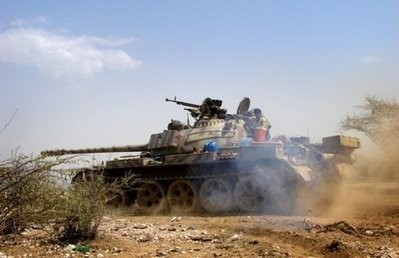Yemen's army accused Shiite rebels of breaking a ceasefire on Friday, just hours after it came into force, saying they killed four soldiers in a string of attacks in the country's far north.
The head of military operations in Saada province, General Mohammed Abdullah al-Qussi, said he himself came under rebel attack.
"I escaped an assassination attempt by the rebels who opened fire on my car," Qussi told AFP.
"The rebels broke the ceasefire and carried out a series of attacks in Iqab district which resulted in dead and wounded among our troops," Qussi added.

Another military source said three soldiers were killed in Iqab and a fourth in Al-Ain district, in the south of Saada province, where the rebels are based, and that several soldiers were wounded.
They were the first reports of violations of the ceasefire between the government and the rebels that came into force at midnight (2100 GMT Thursday) in a bid to end six years of on-off fighting.
There was no immediate comment from the rebels.
Earlier on Friday, army commanders had reported a halt to clashes across the rugged northern mountains after rebel leader Abdul Malak al-Huthi ordered his fighters to respect the truce announced by President Ali Abdullah Saleh.
"Calm reigns on all fronts from Saada and Malahidh (in the far north near the Saudi border) to Harf Sufian," further south, one field commander said.
Commanders had said they had seen rebel fighters start work on removing the roadblocks they have maintained on some of the trunk routes through the northern mountains blocking government traffic.
UN chief Ban Ki-moon welcomed the truce, his spokesman said on Friday.
Ban "hopes that the ceasefire will hold and that it will provide an opportunity to fully resolve this conflict," Martin Nesirky told a media briefing.
Nesirky said the United Nations was still pressing for full access for humanitarian aid to be provided to displaced civilians estimated to number as many as 150,000.
But in a sign of the distrust still felt by some within the army after six years of conflict, one officer told AFP he was waiting to see whether the rebels really respected the truce.
"We are holding our positions and keeping our fingers on the trigger," the officer said, asking not to be named.
Only on Thursday, an official said 12 soldiers and 24 rebels had been killed in heavy clashes in Amran province, north of the capital.
That fighting erupted after a rebel attack in Burkat al-Shamsi district late on Wednesday, the official said.
Separate clashes broke out around the same time in Saada town suburb Al-Uqab, killing seven soldiers and 11 rebels.
The six-point truce requires the rebels to reopen three major routes in the first stage of implementation: the road between Saada, Harf Sufian and the capital Sanaa; the road from Saada west to Malahidh, and the road from Saada east to Al-Jawf.
It also calls for a rebel withdrawal from government buildings, the return of weapons seized from security forces, the release of all prisoners including Saudis, handover of captured army posts, and a pledge not to attack Saudi Arabia.
The Saudis joined the fighting in November after accusing the rebels of killing a border guard and occupying two small villages.
Saudi ground troops and aircraft repeatedly engaged the rebels in operations the rebels said continued even after their fighters had withdrawn from all Saudi territory they occupied during the fighting.
The authorities have accused the rebels of seeking to restore the Zaidi Shiite imamate that ruled in Sanaa until its overthrow in a 1962 republican coup that sparked eight years of civil war.
The rebels, who since 2004 have protested of economic and political discrimination against the north's Zaidis, have repeatedly denied the charge as well as accusations of military support from Shiite Iran.






)

















